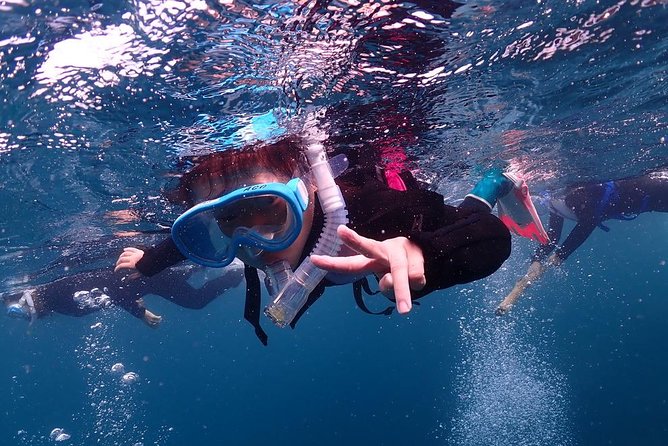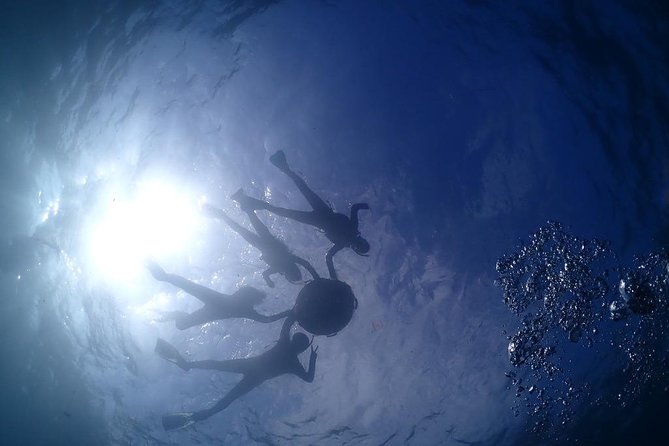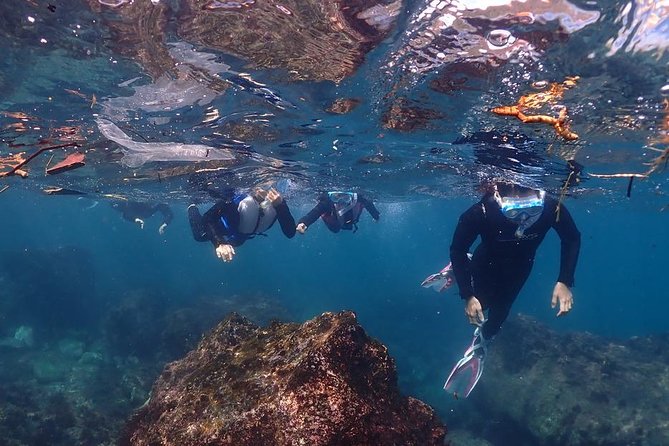Like a gateway to another world, scuba diving and snorkeling invite individuals to enjoy the wonders of the underwater realm. With each breath, they are transported to a realm teeming with vibrant coral reefs, captivating marine life, and hidden treasures waiting to be discovered.
But what makes these water sports so alluring? What experiences lie in store for those who venture beneath the surface?
From the tranquil depths explored by scuba divers to the captivating views observed by snorkelers, this article will shed light on the unique and breathtaking encounters that await those who dare to explore the depths.
Great News! You can reserve your spot for free with Viator. You can easliy cancel any time up to 1 day before without paying anything.
Quick Takeaways

- Scuba diving and snorkeling both offer physical fitness benefits through swimming against water resistance.
- Both activities promote mental well-being by reducing stress and anxiety.
- Snorkeling is more affordable and allows for a casual underwater experience, while scuba diving provides access to deeper dive sites.
- Proper certifications are required for safe scuba diving, and various levels of certifications are available to progress at your own pace.
Not for you? Here's a few more great tours and experiences nearby.
- Half-Day Snorkeling Course Relieved at the Beginning Even in the Sea of Izu, Veteran Instructors Wil
- Experience Diving! ! Scuba Diving in the Sea of Japan! ! if You Are Not Confident in Swimming, It Is
- Let'S Enjoy Scuba Diving in Izu Oceanic Park Izu Peninsula for Certificate Diver
- Half Day Izu Kogen Highlands Downhill Cycling Tour
Benefits of Scuba Diving

What are the benefits of scuba diving and how can it enhance your overall well-being?
Scuba diving offers a myriad of benefits that go beyond just exploring the underwater world. One of the most notable benefits is the opportunity to improve your physical fitness. Swimming against the resistance of water helps to build strength, endurance, and flexibility.
Plus, scuba diving promotes mental well-being by reducing stress and anxiety. The calm and serene environment underwater allows divers to escape from the hustle and bustle of daily life.
On top of that, scuba diving can also enhance your creativity and artistic skills through underwater photography techniques. By capturing the beauty of marine life, divers can express their artistic vision and create stunning visuals.
To fully enjoy the benefits of scuba diving, it’s important to obtain scuba diving certifications. These certifications ensure that divers have the necessary skills and knowledge to dive safely, making the experience even more rewarding.
Snorkeling Tips for Beginners

Snorkeling, a popular water activity, offers beginners a chance to explore the underwater world with ease and excitement. To make the most of this experience, it’s important to learn some basic snorkeling techniques.
First, proper breathing is crucial. Breathe slowly and deeply through your mouth, using the snorkel tube to inhale and exhale.
Next, practice floating calmly on the surface, keeping your body relaxed and horizontal.
It’s also important to wear a properly fitting mask and fins to enhance your comfort and maneuverability in the water.
When it comes to choosing the best snorkeling spots, consider locations with clear waters, abundant marine life, and beautiful coral reefs. Some popular destinations for beginners include the Great Barrier Reef in Australia, the Maldives, and the Caribbean.
Remember to always snorkel with a buddy and follow safety guidelines to ensure a safe and enjoyable experience.
Popular Scuba Diving Destinations

Scuba diving enthusiasts have a stack of popular destinations around the world to explore the wonders of the underwater realm. From vibrant coral reefs to sunken shipwrecks, there is something for every diver’s preference and skill level. Below is a table showcasing some of the best scuba diving destinations:
| Destination | Highlights |
|---|---|
| Great Barrier Reef | World’s largest coral reef system |
| Maldives | Pristine waters and abundant marine life |
| Red Sea | Colorful coral formations and diverse fauna |
| Galapagos Islands | Unique marine species and volcanic landscapes |
Before embarking on these exciting adventures, it is essential for divers to obtain scuba diving certification. This process involves completing theoretical coursework, practical training in a pool, and open-water dives under the guidance of a certified instructor. Several reputable scuba diving schools offer comprehensive certification programs to ensure divers are prepared and knowledgeable about safety procedures and equipment usage. Obtaining certification not only enhances the diving experience but also promotes responsible and sustainable exploration of the underwater world.
Essential Snorkeling Gear

After obtaining scuba diving certification and exploring popular destinations, snorkelers can enhance their underwater experience by ensuring they have the essential snorkeling gear. Here are some important pieces of equipment to consider:
- Mask and Snorkel: A well-fitting mask with a snorkel attached allows snorkelers to breathe comfortably while keeping their face in the water.
- Fins: Fins provide propulsion and help snorkelers move efficiently through the water. They should fit snugly to prevent blisters and provide maximum comfort.
- Buoyancy Control Device (BCD): A BCD helps snorkelers maintain neutral buoyancy, allowing them to float effortlessly on the surface or descend smoothly underwater.
Maintaining snorkeling equipment is crucial for safety and longevity. Rinse gear with fresh water after each use, inspect for damage, and store in a cool, dry place.
Plus, choosing the right snorkeling spots is essential. Look for clear water, abundant marine life, and minimal currents for a memorable snorkeling experience.
Diving and Snorkeling Safety Tips

To ensure a safe and enjoyable experience underwater, it’s important to follow these diving and snorkeling safety tips.
First and foremost, obtaining proper scuba diving certifications is essential. These certifications ensure that individuals have received the necessary training and knowledge to dive safely.
Plus, it’s crucial to adhere to snorkeling etiquette when participating in this activity. This includes respecting marine life and their habitats, not touching or disturbing coral reefs, and avoiding excessive noise that may startle or harm marine animals.
It’s also recommended to always dive or snorkel with a buddy, as this provides an extra layer of safety and support.
Lastly, being aware of one’s own limits and not pushing beyond them is crucial for personal safety while diving or snorkeling.
Exploring Underwater Wildlife

Exploring the vibrant and diverse underwater wildlife is an exhilarating experience for scuba divers and snorkelers alike. The opportunity to witness the beauty and wonder of marine life up close is truly awe-inspiring.
Here are some key aspects to consider when exploring underwater wildlife:
- Underwater Photography: Many divers and snorkelers enjoy capturing the magic of the underwater world through photography. It allows them to share their experiences with others and raise awareness about the importance of marine conservation efforts.
- Marine Conservation Efforts: As more people engage in underwater activities, it becomes crucial to prioritize the protection and preservation of marine ecosystems. By supporting and participating in marine conservation efforts, divers and snorkelers can contribute to the sustainability of underwater wildlife for future generations.
- Ethical Encounters: When exploring underwater wildlife, it’s essential to maintain a respectful distance and avoid disturbing the natural habitats. By adhering to ethical guidelines, divers and snorkelers can minimize their impact on marine life and ensure a positive experience for all.
Scuba Diving Vs. Snorkeling: Pros and Cons

When it comes to underwater exploration, scuba diving and snorkeling offer distinct advantages and disadvantages. Here is a comparison table highlighting the pros and cons of each:
| Scuba Diving | Snorkeling |
|---|---|
| Allows for deeper exploration | Limited to surface visibility |
| Provides access to a wider range of marine life | Restricted to observing surface-level wildlife |
| Requires training and certification | No formal training required |
| Enables longer underwater stays | Limited by breath-holding capacity |
Scuba diving allows for deeper exploration and provides access to a wider range of marine life. However, it requires training and certification, and the equipment can be expensive. On the other hand, snorkeling is more accessible to beginners and doesn’t require any formal training. It is also more affordable and allows for a more casual underwater experience. Both activities offer opportunities for underwater photography, but scuba diving provides better access to deeper dive sites that may offer more unique photo opportunities. When it comes to choosing the best snorkeling spots, popular destinations include the Great Barrier Reef, the Maldives, and the Caribbean.
Planning Your Scuba Diving Adventure

Planning a scuba diving adventure requires careful consideration and thorough preparation. Here are three important factors to keep in mind:
-
Scuba Diving Certifications:
Obtaining the necessary certifications is crucial before embarking on a scuba diving adventure. These certifications ensure that divers have the required skills and knowledge to dive safely. Organizations like PADI and SSI offer various levels of certifications, from beginner to advanced, allowing divers to progress at their own pace. -
Best Time to Go Scuba Diving:
The best time to go scuba diving can vary depending on the destination. Factors such as water temperature, visibility, and marine life activity can impact the overall diving experience. Researching the local conditions and consulting with experienced divers or dive operators can help determine the ideal time to visit a specific dive site. -
Planning and Preparation:
Proper planning and preparation are essential for a successful scuba diving adventure. This includes researching dive sites, checking equipment, arranging transportation and accommodations, and ensuring that all necessary permits and documents are in order. It’s also important to consider safety measures, such as having a dive buddy and familiarizing oneself with emergency procedures.
Frequently Asked Questions
How Long Does a Typical Scuba Diving or Snorkeling Session Last?
A typical scuba diving or snorkeling session can last anywhere from 30 minutes to several hours, depending on factors such as the location, the diver’s experience level, and the conditions. It is important to consider safety precautions and be aware of the different types of marine life encountered during these activities.
Are There Any Age Restrictions for Scuba Diving or Snorkeling?
Age requirements and safety precautions are important considerations for scuba diving and snorkeling. Understanding the minimum age limit and necessary precautions ensures the safety and enjoyment of participants in these activities.
Can I Bring My Own Scuba Diving or Snorkeling Equipment?
Yes, customers can bring their own scuba diving or snorkeling equipment. However, rental equipment is also available for those who prefer not to bring their own. This ensures flexibility and convenience for all customers.
Is Scuba Diving or Snorkeling Suitable for Non-Swimmers or People With Limited Swimming Skills?
Scuba diving and snorkeling are not suitable for non-swimmers or individuals with limited swimming skills. These activities require a certain level of swimming proficiency to ensure safety and enjoyment in the water.
What Is the Cancellation Policy for Scuba Diving or Snorkeling Bookings?
The cancellation policy for scuba diving or snorkeling bookings varies depending on the provider. It is advisable to review the specific terms and conditions outlined by the company to understand the refund policy in case of cancellation.
The Sum Up
To sum it up, scuba diving and snorkeling offer thrilling opportunities to explore the wonders of the underwater world. Whether you choose to dive deep into the ocean or observe the marine ecosystem from above, these activities provide a chance to encounter vibrant coral reefs, mesmerizing marine life, and breathtaking underwater landscapes.
By following safety guidelines and equipping yourself with the essential gear, you can embark on unforgettable underwater adventures in some of the world’s most stunning destinations.
So, get ready to learn about the beauty and tranquility of the underwater realm.



